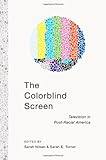The colorblind screen : television in post-racial America / edited by Sarah Nilsen and Sarah E. Turner.
Material type: TextPublisher: New York ; London : New York University Press, [2014]Description: 1 online resource (vi, 357 pages)Content type:
TextPublisher: New York ; London : New York University Press, [2014]Description: 1 online resource (vi, 357 pages)Content type: - text
- computer
- online resource
- 9781479893331
- 1479893331
- Minorities on television
- Race relations on television
- Racism on television
- Television broadcasting -- Social aspects -- United States
- Minorités à la télévision
- Relations raciales à la télévision
- Racisme à la télévision
- Télévision -- Aspect social -- États-Unis
- PERFORMING ARTS -- Reference
- LAW -- Media & the Law
- Minorities on television
- Race relations on television
- Racism on television
- Television broadcasting -- Social aspects
- United States
- 791.45/6552 23
- PN1992.8.M54 C86 2014eb
| Item type | Home library | Collection | Call number | Materials specified | Status | Date due | Barcode | |
|---|---|---|---|---|---|---|---|---|
 Electronic-Books
Electronic-Books
|
OPJGU Sonepat- Campus | E-Books EBSCO | Available |
Includes bibliographical references and index.
Print version record.
"In The Colorblind Screen, the contributors examine television's role as the major discursive medium in the articulation and contestation of racialized identities in the United States. While the dominant mode of televisual racialization has shifted to a "colorblind" ideology that foregrounds racial differences in order to celebrate multicultural assimilation, the volume investigates how this practice denies the significant social, economic, and political realities and inequalities that continue to define race relations today. Focusing on such iconic figures as President Obama, LeBron James, and Oprah Winfrey, many chapters examine the ways in which race is read by television audiences and fans. Other essays focus on how visual constructions of race in dramas like 24, Sleeper Cell, and The Wanted continue to conflate Arab and Muslim identities in post-9/11 television. The volume offers an important intervention in the study of the televisual representation of race, engaging with multiple aspects of the mythologies developing around notions of a "post-racial" America and the duplicitous discursive rationale offered by the ideology of colorblindness."--Publisher's website.
Part 1. Theories of colorblindness. Shades of colorblindness: rethinking racial ideology in the United States / Ashley Doane ; Rhyme and reason: "post-race" and the politics of colorblind racism / Roopali Mukherjee ; The end of racism? colorblind racism and popular media / Eduardo Bonilla-Silva and Austin Ashe -- part 2. Icons of post-racial America. Oprah Winfrey: cultural icon of mainstream (white) America / Janice Peck ; The race denial card: the NBA lockout, Lebron James, and the politics of new racism / David J. Leonard and Bruce Lee Hazelwood ; Representations of Arabs and Muslims in post-9/11 television dramas / Evelyn Alsultany ; Maybe brown people aren't so scary if they're funny: audience readings of Arabs and Muslims on cable television comedies / Dina Ibrahim -- part 3. Reinscribing whiteness. "Some people just hide in plain sight" historicizing racism in Mad men / Sarah Nilsen ; Watching TV with white supremacists: a more complex view of the colorblind screen / C. Richard King ; BBFFs: interracial friendships in a post-racial world / Sarah E. Turner -- part 4. Post-racial relationships. Matchmakers and cultural compatibility: arranged marriage, South Asians, and racial narratives on American television / Shilpa Davé ; Mainstreaming Latina identity: culture-blind and colorblind themes in viewer interpretations of Ugly Betty / Philip A. Kretsedemas ; Race in progress, no passing zone: Battlestar Galactica, colorblindness, and the maintenance of racial order / Jinny Huh.
eBooks on EBSCOhost EBSCO eBook Subscription Academic Collection - Worldwide
There are no comments on this title.

